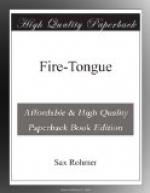Nicol Brinn glanced rapidly about his own luxurious room in an oddly apprehensive manner. “I said that,” he declared, “and I meant it.”
“Then I can only suppose,” resumed Harley, deliberately, “that the cause of your fear lies in the term, ’Fire-Tongue’?”
Brinn again rested his chin in his hand, staring fixedly into the grate.
“And possibly,” went on the remorseless voice, “you can explain the significance of that term?”
Nicol Brinn remained silent—but with one foot he was slowly tapping the edge of the fender.
“Mr. Harley,” he began, abruptly, “you have been perfectly frank with me and in return I wish to be as frank with you as I can be. I am face to face with a thing that has haunted me for seven years, and every step I take from now onward has to be considered carefully, for any step might be my last. And that’s not the worst of the matter. I will risk one of those steps here and now. You ask me to explain the significance of Fire-Tongue” (there was a perceptible pause before he pronounced the word, which Harley duly noticed). “I am going to tell you that Sir Charles Abingdon, when I lunched with him at his club, asked me precisely the same thing.”
“What! He asked you that so long as two weeks ago?”
“He did.”
“And what reason did he give for his inquiry?”
Nicol Brinn began to tap the fender again with his foot. “Let me think,” he replied. “I recognize that you must regard my reticence as peculiar, Mr. Harley, but if ever a man had reason to look before he leaped, I am that man.”
Silence fell again, and Paul Harley, staring down at Nicol Brinn, realized that this indeed was the most hopelessly mystifying case which fate had ever thrown in his way. This millionaire scholar and traveller, whose figure was as familiar in remote cities of the world as it was familiar in New York, in Paris, and in London, could not conceivably be associated with any criminal organization. Yet his hesitancy was indeed difficult to explain, and because it seemed to Harley that the cloud which had stolen out across the house of Sir Charles Abingdon now hung threateningly over those very chambers, he merely waited and wondered.
“He referred to an experience which had befallen him in India,” came Nicol Brinn’s belated reply.
“In India? May I ask you to recount that experience?”
“Mr. Harley,” replied Brinn, suddenly standing up, “I can’t.”
“You can’t?”
“I have said so. But I’d give a lot more than you might believe to know that Abingdon had told you the story which he told me.”
“You are not helping, Mr. Brinn,” said Harley, sternly. “I believe and I think that you share my belief that Sir Charles Abingdon did not die from natural causes. You are repressing valuable evidence. Allow me to remind you that if anything should come to light necessitating a post-mortem examination of the body, you will be forced to divulge in a court of justice the facts which you refuse to divulge to me.”




